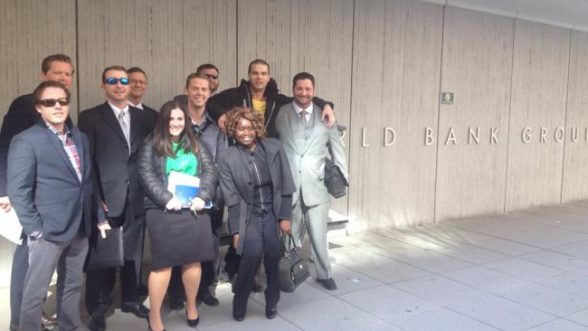
Interfacing with experts directly involved in the evolution of energy in America was a priceless opportunity for Chase Puckett.
“I could write a novel on the many things I learned from this trip,” said Puckett, a student in the Global Energy Management Program. “With my focus being in oil and gas, the questions I was able to ask the American Petroleum Institute had a direct impact on my views regarding my career … I would do the trip again in a heartbeat.”
Puckett was among nine GEM students, along with faculty and staff, who attended a series of high-level energy briefings in Washington, D.C. in April 2014. This trip is part of the Washington Course, a one-hour credit course offered by the Global Energy Management (GEM) Program at the University of Colorado Denver Business School.
Over a three day period, GEM students, faculty, and staff met with representatives from the World Bank, Department of Energy, Department of The Interior, American Petroleum Institute, American Council on an Energy Efficient Economy, Nuclear Energy Institute, and American Council on Renewable Energy. They also attended the Building Energy Summit.
Adam DeRito, a member of Cohort XI and Lease Operator for Noble Energy, found the meeting with the World Bank very informative.
“I never really knew how the World Bank worked before, but seeing how the various aspects of the bank worked in conjunction with various departments and countries who request loans for various programs was very intuitive,” he said. “This could help me as an energy manager in the future who may work in third world countries or developing nations that would require help from the World Bank in developing their increasing energy requirements.“
Conversations with representatives from the Department of the Interior was also very applicable to DeRito’s current job. “Understanding the development of the current regulations and the new regulations being developed for the oil and gas industry gave a very good overview of what I can expect as a production site manager for Noble and what I can do to help improve the reputation of the industry as well as continue to be innovative despite the new regulations,” he said.
At each briefing, current energy policy programs, regulations, challenges, and issues were discussed from the organization’s or agency’s perspective. In addition, each briefing included a discussion of upcoming energy issues that will be faced by the U.S. and world economies over the next several years.
All students in the Washington, D.C. course are encouraged to develop professional relationships with the presenters who are high echelon government officials, policy makers, and policy advisors in Washington, DC. Students will write two papers each on current and future energy oriented topics discussed during the briefings that are relevant to future energy managers.
The Washington Course continues for six weeks after the D.C trip and includes discussion groups, paper submissions, and staying abreast of the issues discussed during the briefings. Starting in the fall, these briefings will also be open to alumni and advisory council members.


